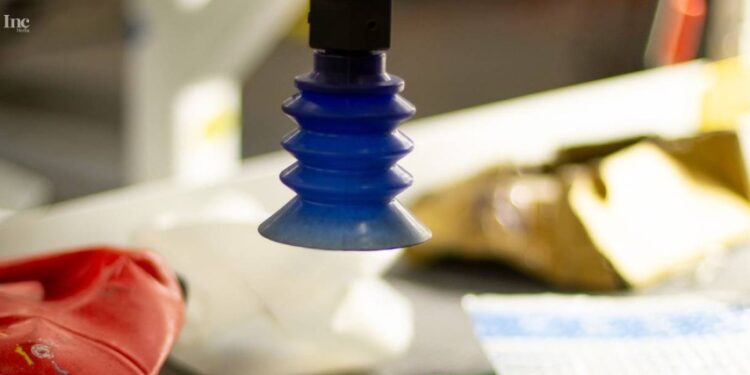AI-powered cameras created by Greyparrot, the British startup, will analyze the waste processing and recycling facilities to manage waste. It will simplify the process of identifying different materials from waste.
According to the report by the world bank, almost 2.24 billion tonnes of waste generation was recorded in 2020 globally. Anticipation is that this count will surge by 73% and reach 3.88 billion tonnes by the end of 2050.
While looking at distinct types of waste, it is identified that plastic recycling is the biggest challenge. According to research by the University of Georgia and California, it was found that from 1950 to 2015, around 8.3 billion plastic waste was generated.
GreyParrot Founder Developed AI System to Analyze Waste Recycling Facilities
The UK-based startup, Greyparrot, introduced the artificial intelligence (AI) system to monitor recycling and waste processing facilities efficiently. It intends to identify and figure out solutions for pressing issues relevant to waste management.
She says, “In a single day, you will have literally mountains of waste in one facility coming through, and what’s very shocking and surprising is that it never stops. There are no holidays for waste; it just keeps coming.”
Greyparrot comes up with an innovative approach to camera installation on the conveyor belts. It is installed at around 50 waste and recycling sites all over Europe. A unique thing about this camera is to capture real-time footage related to the materials as they slide across the belts. The AI software created by Greyparrot can get efficiently employed for reviewing the complete process through the visual data.
AI Technology has made important advancements in several years, specifically for recognition and image processing. A large sum of rubbish is generated globally every year and takes time to analyze.
Plastic is always a problematic issue for the environment globally. It begins with the large-scale production of various materials. Mikela Druckman, the founder of Grey Parrot, has reviewed these statistics in detail and developed an intuitive AI system specially designed to evaluate the waste processing system and the recycling facilities.
The Greyparrot cameras are installed to analyze the piling up of waste at over 50 recycling sites in Europe, and the AI software proves helpful in assessing what passes across in real-time.
Druckman aims to increase the pace at which consumer goods get recycled in the market. Here, AI technology comes into the picture. It is a progressive technological innovation that increased by leaps and bounds in the last year, and its image-processing capability is also quite sophisticated. Ms Druckman also mentioned that it is critical to manually train the system for environmental waste recognition.
“A product like a Coke bottle, once it goes into the bin, will be crumpled, crushed and dirty, and makes the problem much more complex from an AI standpoint.”
Can AI Prove Helpful in Protecting Environment?
Reportedly, the Grey Parrot system can track around 32 billion waste objects yearly, and the firm has eventually created a vast map for managing digital waste. With the help of this extensive data, digital waste managers can become operationally efficient, and it is also shared on a wider level.
Ms Druckman says, “It is allowing regulators to have a much better understanding of what’s happening with the material, what materials are problematic, and it is also influencing packaging design.”
“We talk about climate change and waste management as separate things, but actually, they are interlinked because most of the reasons why we are using resources is because we’re not actually recovering them. If we had stricter rules that change the way we consume and how we design packaging, that would have a very big impact on the value chain and how we are using the resources.”
With this innovative mindset, she is already hoping that big brands and leading producers will begin data processing through firms like Greyparrot and eventually end up designing multiple reusable products.
Many other companies are developing unique solutions for better packaging based on these lines. The Footprint is collaborating with Supermarkets and Gillette to transform its plastic razor trays into ones created from plant-based fibre.
Even the UK government is developing ideas to encourage people to recycle. The administration of Northern Ireland and Wales is planning the deposit return scheme by 2025. It will include ‘Reverse vending machines’ in shops and other public areas where people can easily deposit their waste bottles and metal drinks cans. They will get paid for doing this per item.
These small steps can create a planet-friendly ecosystem and eliminate rubbish in the long race. Greyparrot has reached a milestone by tracking 32 billion waste materials annually. It will help companies and waste managers make apt decisions on recycling and disposal of waste.
Small footprints and awareness towards recycling and waste management can help create a clean and environmental-friendly ecosystem in the coming times.















 The Inc Media is one of the most renowned global Online Business Magazines, that carries news stories about entrepreneurship, small business management, and business. Being a global business magazine, we carve for influential stories and try to take them globally to uplift the business standards and educate the people about new innovations in the business world...
The Inc Media is one of the most renowned global Online Business Magazines, that carries news stories about entrepreneurship, small business management, and business. Being a global business magazine, we carve for influential stories and try to take them globally to uplift the business standards and educate the people about new innovations in the business world...